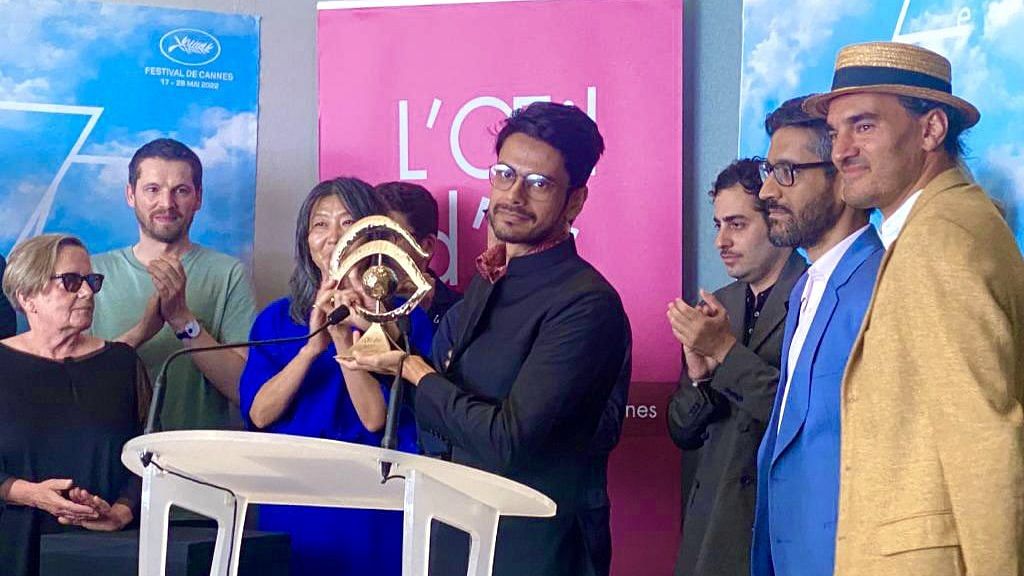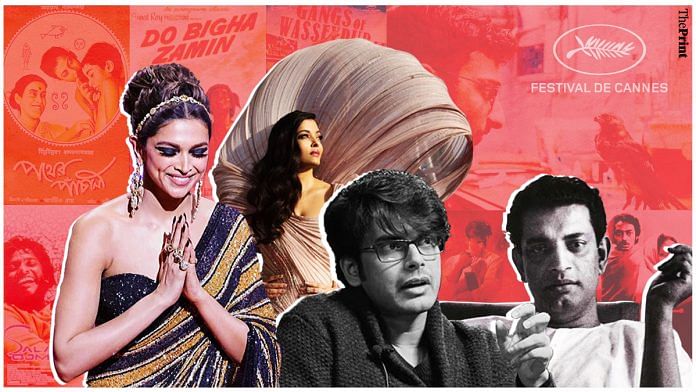This year, more than 400 Indians–from actors and filmmakers to social media influencers and executives–flocked to the 75th edition of the Cannes Film Festival, which has become famous not just for its awards but also for its red carpet fashion. Actor Deepika Padukone was part of the nine-member jury while Aishwarya Rai Bachchan made her historic 21st appearance on the red carpet. India is also the first ‘Country of Honour’ at the Marche du Cinema, the business segment of the marquee festival.
But behind the sparkling jewellery and fabulous ball gowns, is another narrative on the paucity of offerings from India. Shaunak Sen’s All That Breathes, which won the Grand Jury Prize at Sundance Film Festival, was the sole contender in the official selection at Cannes, while student-film Nahua by Pratham Khurana and two restored films, Satyajit Ray’s Pratidwandi’ and G. Aravindan’s Thamp, were also screened. Now All That Breathes has won the L’Oeil d’or —the Golden Eye — at Cannes. It is the top documentary award.
As India gets ready to celebrate its 75th year of Independence on 15 August, it’s worth examining the cultural influence the country exerts across the international entertainment arena. Only 10 Indian films have won awards at the Cannes Film Festival since it began in September 1946.

No dearth of stories
In 2013, when she was juror at the Festival de Cannes for the second time, actor Nandita Das was asked a similar question. Why are there so few Indian films? “In India, there is no dearth of stories, both in life and literature. But sadly we don’t give the script the importance that it deserves,” she had said.
Nine years later, when Padukone was asked the same question—this time not only as an actor, but a jury member—she had a different answer. Indian creators, actors, directors and writers are doing “everything correct”. The problem was with the “selection process”, she said in an interview with film critic Anupama Chopra.
While anyone can submit their film at the film festival, only a handful are shortlisted from over a thousand films, and by extension, compete for the coveted The Palme d’Or (or Golden Palm). Padukone said she often saw films that could be screened at Cannes. “I am not even talking about winning, that is secondary. But I am beginning to be convinced about the fact that it has something to do with the selection process. A lot of our movies deserve to be here,” said Padukone.
This is a contentious issue, one that the popular jury is still divided on. Senior journalist and former editor of India Today Kaveree Bamzai believes that India still has a long way to go. “We need to create films that are authentic. We need to own up to our roots, and only then could that appeal to a global audience. We are still not doing that,” Bamzai told The Print.
The last time an Indian film was selected to compete in the main Palme d’or award was in 1994 — director Shaji N. Karun’s Malayalam film Swaham. That year, the award went to Quentin Tarantino’s Pulp Fiction. “Anyone can submit their films, hence it’s surprising that India has not had a film in the main competition in Cannes in nearly three decades, especially given the enormous film culture we have. But it boils down to what structures there are to support independent cinema — both private and public — those are the things we need to bolster,” said director Shaunak Sen.
He explained that in a robust film culture, mainstream films and those geared towards artistic quality have to co-exist. “The way forward is to support independent cinema and independent voices that are not subservient to the mainstream machinery,” he added.
Also Read: 75th Cannes Film Festival: Ruben Ostlund takes away second Palme d’Or with ‘Triangle of Sadness’
India’s greatest hits
It’s not that Indian films haven’t won accolades in the past. In 1946, Chetan Anand’s story depicting the class divide in Indian society, Neecha Nagar won the Grand Prix du Festival International du Film (now called Palme d’Or). Later in 1950, Anand was inducted as a member of the international jury, becoming the first Indian to be on it.
The classic film Do Bigha Zamin by Bimal Roy won the Prix Internationale in 1954. Roy’s Biraj Bahu was also nominated for the Golden Palm in the consequent year.
Satyajit Ray, a Cannes favourite, won the Palm d’Or for Pather Panchali in 1956, while in 1982, Mrinal Sen’s Kharij won the Special Jury Prize. A few years later in 1988, Mira Nair’s Salaam Bombay won both the Camera d’Or and the Audience Prize.
Mainstream Bollywood also made its debut at Cannes in 2002 with the screening of Sanjay Leela Bhansali’s magnum opus Devdas. Anurag Kashyap’s Gangs of Wasseypur(2012) and Baahubali: The Beginning (2016) are some of the other Indian films that were screened at the festival over the years.
Also Read: Indian film ‘All That Breathes’ bags top documentary award at Cannes 2022
Commerce over cinema
Cannes Film Festival is one of the longest-running international film festivals in the world. It came into being after the world’s first international film festival, the Venice Film Festival, transformed into a vehicle for fascist and Nazi propaganda. An outraged France decided to organise an alternative film festival. After initial hiccups due to World War II, Festival de Cannes began in 1946 and came to be regarded as the most prestigious in the world — a title it still holds today.
Over the years, its business counterpart Marche du Cinema, also known as Cannes Film Market, started gaining traction. It is in this arena that India created the biggest splash as it was deemed the ‘Country of Honour’. The Indian delegation this year led by Union Minister of Information & Broadcasting Anurag Thakur comprised actors R Madhavan, Tamannaah, Nawazuddin Siddiqui, and Chairperson of the Central Board of Film Certification Prasoon Joshi, among others.
The Cannes Film Festival and its industry arm Marche du Cinema are two separate entities. While the festival is invite-only, anyone including producers, distributors, programmers and buyers can attend its Film Market. Madhavan’s directorial debut ‘Rocketry: The Nambi Effect‘ and few other Indian films were screened at the Cannes Film Market, but were not connected to the film festival.
In Bamzai’s opinion, the commercialisation of the festival is a “big deal” — in a good way. “For India to be selected as ‘Country of Honour’ and having been able to showcase its talent is a true measure of its reach and success,” she said, adding that it would be interesting to see the number of deals the Union Ministry of Information and Broadcasting signed at the industrial event.
And as for India’s showing in the coming years? Padukone implored Indian creators to trust their work. The festival showcases thousands of films from around the world and could open doors for Indian filmmakers beyond the realm of Bollywood.



